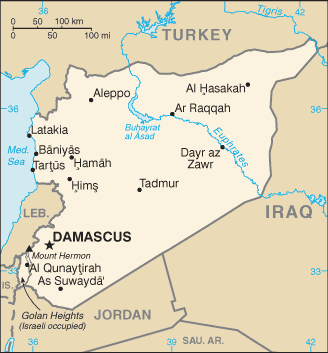Iraqi Shi’ite militants have crossed the border to fight in Syria, often alongside President Bashar al-Assad’s troops, adding to the sectarian nature of the proxy war there.
 The news that Shi’ite Iraqi militias are fighting in Syria with the Assad regime and against many of the other foreign fighters, primarily Sunni, that have flooded into Syria to fight alongside the rebel opposition complicates and compounds an already messy civil conflict rife with foreign fighters and meddling from foreign powers.
The news that Shi’ite Iraqi militias are fighting in Syria with the Assad regime and against many of the other foreign fighters, primarily Sunni, that have flooded into Syria to fight alongside the rebel opposition complicates and compounds an already messy civil conflict rife with foreign fighters and meddling from foreign powers.
This conflict has gone far beyond Syrian opposition groups taking up arms against the Assad regime. On the one hand, there are Sunni militant groups flooding to Syria from all over the Arab world, including Sunni fighters from Iraq as well as Sunni Gulf states, and they are fighting to topple Assad. Many of these groups are hard-line Islamic jihadists fighting under the banner of al-Qaeda.
On the other hand, there are Shi’ite militias from Iraq fighting to keep Assad in power. “Among them are defectors and former fighters from anti-U.S Iraqi cleric Moqtada al-Sadr’s Mehdi Army, the Iran-backed Badr group and Asaib al-Haq and Kata’ib Hezbollah, militias who once waged a bloody war on American troops,” Reuters reports.
Many of the Shi’ite Iraqi militants claim to pledge loyalty to Iran’s supreme Shi’ite religious leader, and Iraq’s Shi’ite leadership claims they have no sanction from Baghdad.
The unraveling and increasing complexity of the war in Syria is in part a reflection of the great power politics of the region. Syria’s Assad is Iran’s close ally, both Shi’ite. Sunni monarchs in the Gulf, like Saudi Arabia, Qatar, Kuwait, et al. want Assad to go in the hopes that a Sunni ally will arise in Syria. These Gulf states are supporting their own foreign Sunni fighters in Syria.
The argument that the United States ought to get involved in the sectarian proxy war is becoming exceedingly dangerous. The US is already sending aid and facilitating the delivery of weapons from the Gulf states to rebel groups fighting to topple Assad, but recent reporting has confirmed Washington has little control over who receives that assistance. Meddling in Syria needs to reduce overall if conditions on the ground are to improve.


